Advertisement
Here's Why Being A Conscientious Meat Lover Is A Thing — For Good!

Ever thought about going full-on vegetarian but just couldn't bite the bullet? Maybe you know someone who's swapped their burgers for beans to line up with their values but really misses eating meat—and, well, you're not super eager to know what that's like.
There's good news: If you eat all the things, you don't have to look too hard anymore for reasons to feel good about it.
Sure, at one point, cutting out certain foods (ahem, meat) was the conscious consumer thing to do, especially if you had limited access to organic, 100% grass-fed, and pasture-raised meats. Don't get us wrong: Current conventional meat practices are still at odds with making the world better, but choosing clean meat is an important step in the right direction. And thanks to companies like Applegate, clean meat is actually an affordable option now, so you can sizzle your bacon and support a more socially responsible system at the same time.
What the modern conscientious meat eater actually looks like.
Omnivorism doesn't just come with an equal-opportunity appetite; it comes with responsibility, and it's important to choose your animal foods intentionally. Applegate gets it and even coined a name for this modern meat-eating lifestyle. Enter the Applegatarian: a person who consciously chooses clean, crave-able meat for ethical*, environmentally responsible**, and delicious reasons.
Feeling seen? You just might be an Applegatarian if…
You want to eat clean, but you also want a hot dog.

Lean into it. When it comes to ethical farming, Applegate takes every animal's living standards seriously, banning antibiotics and growth promotants in its animal agriculture and ensuring these animals are fed a 100% vegetarian diet with no animal byproducts (for instance, their beef is always 100% grass-fed). That means their natural and organic hot dogs, bacon, sausages, deli meats, and more are all options for clean and complete protein sources. We could go into a whole section on the nutritional benefits of complete animal proteins here, but we cover that in detail over here—check it out!
And just like anyone who's committed to a vegan diet, conscientious omnivores don't just prioritize their own health—the environment's health is top of mind, too.
You want to shrink your footprint—without giving up burgers.
What if we told you that in order to save the planet, one way you could start is by eating properly raised meat? While factory farms and livestock operations are responsible for a hefty share of climate problems and land destruction, the movement to reverse the damage is literally gaining ground on regenerative farms and ranches.
Healthy soil needs grazing animals like cattle to improve water infiltration, increase its below-ground biodiversity (the wonders of all-natural fertilizer!), and importantly, help remove carbon from the atmosphere—things that vast acres of monocropped produce can't do. Learning to raise and eat animals close to the way nature intended could be what moves the needle on better environmental health in the long run.

If you care about the impact your food choices have on the earth, chances are you're already making some better decisions. You might not give up your burger habit completely, but maybe you're choosing a brand that shares your values around regenerative farming and raising animals humanely (read: yes to pastures, no to antibiotics).
TL/DR? It's an amazing time for omnivore pride. Of course, if you don't feel called to eat meat often (or ever), listen to your body. But if you do want to include animal protein as a part of your diet, go for clean, crave-able, and responsible meat.
*Ethical: Animals raised with no antibiotics ever or growth promotants, on vegetarian feed with no animal byproducts (beef is 100% grass-fed) and with space to engage in natural behaviors and promote natural growth.
**Environmentally responsible: Applegate requires all animals to be raised without antibiotics. Applegate is committed to advancing agriculture and processing systems like organic, non-GMO, and regenerative farming.

Why Nutrition Is Key To Changing Your Relationship With Alcohol
Brooke Scheller, DCN, CNS

Why Alcohol Sabotages Your Gut Health & How To Get Back On Track
Brooke Scheller, DCN, CNS

Why Nutrition Is Key To Changing Your Relationship With Alcohol
Brooke Scheller, DCN, CNS

Why Alcohol Sabotages Your Gut Health & How To Get Back On Track
Brooke Scheller, DCN, CNS

Why Nutrition Is Key To Changing Your Relationship With Alcohol
Brooke Scheller, DCN, CNS

Why Alcohol Sabotages Your Gut Health & How To Get Back On Track
Brooke Scheller, DCN, CNS

Why Nutrition Is Key To Changing Your Relationship With Alcohol
Brooke Scheller, DCN, CNS

Why Alcohol Sabotages Your Gut Health & How To Get Back On Track
Brooke Scheller, DCN, CNS















